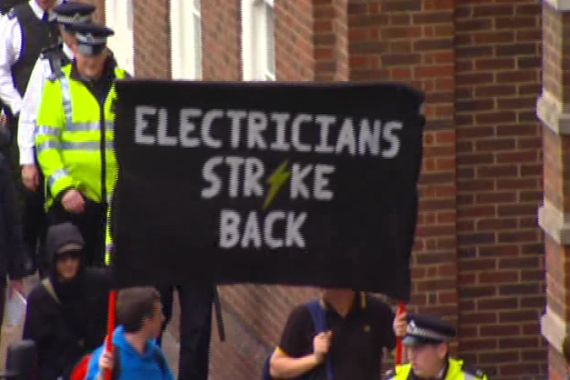Public-sector workers begin strike in UK
Up to two million workers to stay away from work in protest against pension overhaul and austerity measures.

Nearly two million British public-sector workers opposed to government pension cuts, are set to embark on a 24-hour general strike.
Wednesday’s strike will involve immigration officers, teachers, garbage collectors, firefighters and other public-sector workers spanning 30 union groups, and will be the largest since 1979’s Winter of Discontent.
Keep reading
list of 4 itemsWhy are nations racing to buy weapons?
Parallel economy: How Russia is defying the West’s boycott
US House approves aid package worth billions for Ukraine, Israel
Angry over pension overhaul, which they say will require them to work longer before receiving a pension and contribute higher amounts each month to the account, as many as two million people could stay away from work on Wednesday.
Some within the Confederation of Trade Unions, the group organizing the strike, predict the walkouts could be the largest since 1926’s General Strike.
Austerity measures are also one of the catalysts of this strike. Downing Street extended on Tuesday a cap on public-sector pay raises through to 2014.
Reporting from London’s Heathrow airport, Al Jazeera’s Andrew Simmons said many people will be taking strike action for the first time in their lives. For a head teachers’ union, it will be the first strike in their 100-year history.
Monica Hirst, a nursing educator and single mother, told Al Jazeera’s Laurence Lee in London that government cuts have left the people with no other option than to walk out.
“I don’t want to be losing a day’s pay…but we have no choice we’ve been backed into a corner,” she said.
David Cameron’s government, however, does not see the walkouts as the solution to the challenges ahead for the UK economy.
Plea to unions
Speaking in front of parliament on Tuesday, George Osborne, the finance minister, asked union leaders to call off the strikes.
Osborne said he is at a loss at “why they [strikers] are damaging our economy at a time like this, and putting jobs at risk” with strikes that many fear could prove chaotic for international travel and shut down schools.
The government says today’s strike could cost the nation up to $800mn.
Airport operator BAA, which runs London’s Heathrow airport, the third busiest in the world, has told passengers that they could face up to 12-hour delays as immigration staff leave their posts.The government “is taking any means to try and keep things normal” while ensuring security is maintained at an airport that checks up to 60,000 passports in its five terminals per day, says Simmons.
Education officials say nine out of 10 schools will close.
Cameron has implemented a four-year plan for spending cuts totalling $126bn.
The prime minister hopes the public-spending cuts will reduce debts he says his predecessors in the Labour Party-led government racked up before the 2010 election.
The Office for Budget Responsibility, Britain’s national economic forecaster. predicted on Tuesday that 710,000 public-sector jobs will be lost by 2017 under government spending cuts.
That number is an increase of 77 per cent from the previous estimate of 400,000.
Nurses, teachers, and paradmedics, in particular, whom Simmons says are considered most at risk from these government policies have “a great deal of sympathy” going into today’s action.